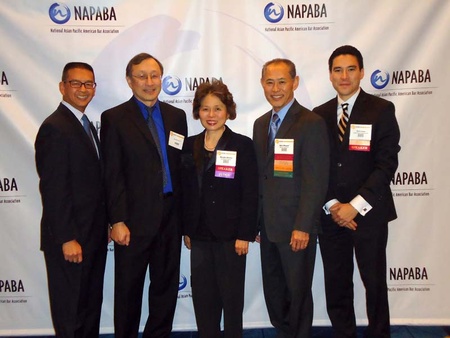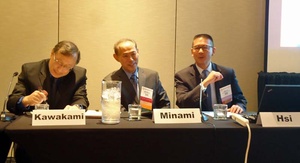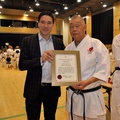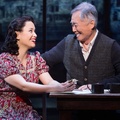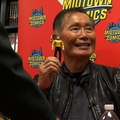On November 15, I travelled to Washington D.C. to appear in a panel assembled to commemorate the 70th anniversary of the Japanese American and Japanese Canadian internments at the annual conference of the National Asian Pacific American Bar Association (NAPABA). In attendance were 1,800 lawyer-delegates from across North America. The panel I presented with consisted of Dale Minami, Rod Kawakami, and Justice Maryka Omatsu. Minami and Kawakami are two of the architects of the legal challenges that led to the Japanese American redress, and Justice Omatsu was one of the negotiators of the Canadian redress for the National Association of Japanese Canadians (NAJC).
Our session was entitled “70th Anniversary of the Japanese American/Japanese Canadian Internment – Redress, Remember, Relate”. I was honoured to participate in the panel, and more than a little humbled to sit among such esteemed company. I’m an entertainment lawyer by trade, but after eleven years of work researching and writing Hatsumi, I have gradually become comfortable discussing both the internment, and the legacy of the redress. I would have expected that practicing entertainment law and being presented as a “human rights” speaker would be an unusual combination, but in the JC/JA community, apparently not so. I was delighted to learn that a large component of Dale Minami’s legal practice in San Francisco has always centered on entertainment law. Dale beat me to the punch of that unique combination by over forty years.
Moderator Jeff Hsi, a lawyer that practices intellectual property law in Miami and Boston, conceived of the panel during a visit to Toronto, following his first meeting with Justice Omatsu in 2011. Jeff opened the panel by explaining that few in the U.S. are aware of the differences between the U.S. and Canadian internments. He emphasized the importance of achieving redress, but also the fact that remembering the details around the internments remains key to our collective ability to understand and support modern human rights law.
Rod Kawakami spoke about the Gordon Hirabayashi case. As many readers will no doubt know, Gordon Hirabayashi was a Nisei American. He was a pacifist who consciously defied the U.S. internment order and subsequently refused military service, which resulted in his internment and a subsequent one-year prison sentence.
In the early 1980’s, Kawakami and his team assembled a challenge to Hirabayashi’s initial conviction, through a rarely available U.S. appeal path (called corum nobis) that relied on the argument that newly emerged evidence, that had been repressed at the time of the initial trial, proved that the court that had first tried the case had fundamentally erred in its decision. The case was re-tried and the court determined that the new evidence demonstrated that there was no military reason for the exclusion of Japanese Americans from the coast and thus that the Japanese American internment itself was an illegal act.
Regrettably, Gordon Hirabayashi passed away on January 2nd of this year. Hirabayashi had strong links to Canada, after his decision to remain in Edmonton in 1959, where he spent the rest of his career as a professor at the University of Alberta. In April of this year President Obama posthumously granted Hirabayashi the Presidential Medal of Freedom for his principled opposition to the Japanese American internment.
Dale Minami spoke about the Fred Korematsu case. In large part because of the publicity of his challenge to the legality of his initial detention during the Japanese American internment, Korematsu’s name has become synonymous with the quest for racial equality in the U.S., and mentioned in the same breath as the likes of Rosa Parks.
Fred Korematsu was a Nisei Japanese American who had refused to report to authorities when the internment order was given in 1942. Korematsu was eventually found and jailed in San Francisco. His case took on initial prominence when a civil rights lawyer offered to use Korematsu’s case as a test case to challenge the legality of the Japanese American internment before the Supreme Court. Korematsu agreed to be the subject for the challenge. Unfortunately in 1943 the U.S. Supreme Court sided with the government.
Following the strategy of the Hirabayashi challenge, Minami’s team argued that Korematsu’s case warranted re-trial on the basis of corum nobis. Due to the fact that Korematsu’s case had already been heard by the Supreme Court, Minami’s application of the corum nobis rule was unprecedented. Ultimately the case was re-tried and Minami’s team won the case before the U.S. Supreme Court in 1987, following the similarly decided Hirabayashi case by a matter of months. After living for 40 years with his conviction, Korematsu was completely exonerated.
Fred Korematsu was awarded the Presidential Medal of Freedom by President Bill Clinton in 1998, and he continued to speak out about the paramount importance of civil liberties until his death in 2005. In 2011 the first annual Fred Korematsu Day of Civil Liberties and the Constitution was declared and commemorated by the Government of California.
Importantly, the outcomes of both the Hirabayashi and the Korematsu cases established strong legal precedents for the fact that the U.S. internment had breached the individual rights of U.S. citizens, clearing the path for individual actions for restitution. The legal implications of that momentum was quickly recognized by the U.S. government and the negotiations that led to the U.S. redress was the result.
© 2012 Chris Hope


